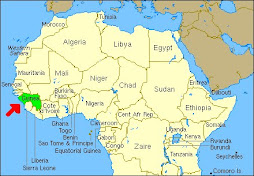The first reality shock hit when the volunteers living there asked if I could bring them up a few groceries: eggs, tomatoes, potatoes, oranges. So basic, but unavailable in Tourou.
The eggs survived better than the shake-down my bones got on the moto ride up the mountain. Tourou is a spread-out dusty town directly on the Nigerian border. The animist women there wear red calabashes on their heads, to indicate their marital status. A metal spike through their lips or their noses indicates if they are lucky wife #1, #2, etc. A couple of them were so drunk on bilbil, the millet beer, that they almost ran into me. And they were cross-eyed!
The central market area of Tourou offers a couple of small shops that sell powdered milk, soap, sugar, pens… and that’s about it. The villagers use a mix of the Central African Franc (CFA) and the Nigerian currency, the nira. The PCVs in Tourou come down to Makala roughly once a week just for basic supplies. No cookies, no booze available in Tourou.
In these towns, the PCV walks out their front door and everyone in town knows their name. You cook by candle light, and go to the bathroom in your outdoor latrine, under the stars. You perfect a squat position that allows you to aim into the hole in the ground that is your toilet. My full-ceramic toilet in Makala, on the other hand, even flushes.
This is where I was at the moment of Barack’s inauguration. It seemed like a mountain cottage vacation—no running water, electricity, cell phone network. Definitely no internet! Sitting in the semi-dark, we caught bits of Barack’s inaugural speech intermittently mixed in with a little programming from a German shortwave station. I was grateful for the glimpse from home, thinking how barely over a year ago, I lived in the thick of that DC madness. And how I couldn’t be further away now…
Working in Tourou is humbling. Makala is a larger town so the connections aren’t as personal, and my work is at a more institutional level. So when the volunteer living there first asked me to come to Tourou, I racked my brain to think of how I could give an effective presentation on budgeting. Everything I would say would be translated from French into the local language Hide, so that nixed any visual aids with words. But then I remembered the women can’t read anyway. I began planning my work… only to remember again that… they don’t know how to add and subtract—at least not in the pen and paper sense of classic schoolrooms.
Ultimately, I ended up “printing out” mad amounts of cash… on notebook paper, with crayons. Central bank of Fleurange! I drew little pictures to represent categories on which I assumed the women spend money—food, school supplies, medicine, clothing, helping out friends/family. (Sadly, my drawing for “transportation” looked like Kermit the Frog on a motorcycle.)
My goal was to talk about budgeting and saving the unspent portion. During my presentation, the women told me how much they earned per week from their varied businesses. One woman walks the greater Tourou area to collect beans from farmers to resell at the market. Another prepares beans and beignets, another fish; one sells salt. I gave them their weekly income in my fake money, then they placed their money on the pictures/categories to show how they spent it in a typical recent week.
Voila a few of the categories: medicine, transportation, school fees and supplies.
Usually, however, I think it’s the Peace Corps Volunteer who learns as much as the people we’re supposed to be helping. In the end, the women came away with about a dollar of earnings per week. With this amount, you can buy you a couple servings of beignets, a ball point pen, a serving of tofu, and one short ride on a motorcycle. I usually spend this amount every single day just on my food alone—and I have no kids, rent, or school fees to pay for!! I was humbled and a little lost for words when I realized just how little these women were working with. There was absolutely no money left over to talk about “savings.” Fortunately the other PCV, who had been there longer than I, came to my rescue, reminding the women that by pooling their money they could access more goods. It’s overwhelming how such a little of our Western cash can go such a long way in a country such as this. To satisfy their other needs, these women are subsistence farming, walking EVERYWHERE, using no electricity, and carrying water from who-knows-where. With weekly incomes of a dollar, and families of nine kids, I see why so few kids are in school, which costs about $15 a year. I see why it’s easier to hike barefoot over rocks than to spend 60 cents on a new pair of flip flops.
So Tourou is eye-opening, and I don’t always have a lot of answers. This women’s group is managing to put aside a little bit of money each month. I’d always read about folks who live on a dollar a day, or two dollars a day… but there’s nothing like chucking the literature and getting into the mountains myself, to see how far or where a dollar really goes.




No comments:
Post a Comment